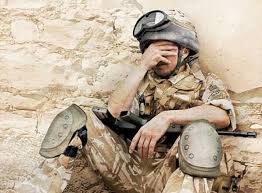Changes of Heart: An Iraq War Veteran’s Faith Story
 |
| Google Image |
Klay is a U.S. Marine Corps veteran of the Iraq War and
the author of the short story collection Redeployment,
which won the 2014 National Book Award for Fiction. In 2018 he received the
George W. Hunt, S. J., Prize for Journalism, Arts & Letters.
I read his story with the readers of this blog
in mind. Though few of us have experienced the trauma of war, Klay appears to
have struggled with faith problems shared by many who are searching for God. He
started from the position of a practicing, but doubt-filled, Catholic.
“Faith, for me, has always been a place to
register a sense of doubt, of powerlessness, of inadequacy and uncertainty
about my place in the world and how I am supposed to live,” Klay writes.
Facing Human Frailty
“You kneel before a crucifix. Before a broken,
tortured and humiliated human body. You face human frailty, and human cruelty.
You call to mind your sins. All that you have done, and all that you have
failed to do, in a place where nevertheless you know you are accepted and
forgiven.”
The author, an obviously thoughtful person,
writes from the viewpoint of a man caught up in a conflict not of his making or
choosing, trying to extract from his faith a way to cope.
“Those early days in Iraq were so busy it was
easy to get lost in the constant flow of work. But my time at Mass, and
particularly my time in confession, were when time stopped for me; and I tried
to imagine ways of reordering myself in relation to this very disordered,
broken world. Then I poured out my doubts, received reconciliation and went back
to my confusing day job.”
But on his return home, things changed. Battlefields
sometimes make faith stronger, forcing its participants to look more closely at
the meaning of life and making the leap of faith.
 |
Phil Klay
Google Image
|
“But this was not my situation,” writes Klay. “…I stopped going to Mass. It was not a
conscious decision. It would be a year before I would admit to a woman I was
dating that I no longer believed in God. It was more that I simply stopped
feeling the need to trouble myself about my spiritual life.
“My understanding not simply of the war but of
myself shifted. I was not a fallen creature in a broken world reliant on grace,
but a Marine in a successful army that had all the answers. I was justified not
by a cross, but by an interpretation of public policy, not by the cruel and
barbaric torture and murder of an innocent man, but by politics.
“It increasingly seems to me that the
certainty of earlier life was based on fantasies of an orderly future in a
rational, controllable world, fantasies that were no more than the wish that
the Leviathan might one day be tied down by force.”
Eventually, Klay learned to accept uncertainty
in his faith as he was obliged to do in every other aspect of life. He accepted
that faith doesn’t pretend to provide all the answers but allows us to live a
meaningful, God-filled life that rejects the cold irrationality of an
indifferent universe.
The Image of Our Tortured God
“And so,” he writes, “though I struggle with
faith, faith not only in God but in my country, my church and my fellow men, I
go to Mass. I return to doubt, and confusion and uncertainty. I return to a
social gathering. To a meal. To the experience of music, to the image of our tortured
God, to the recitation of words. To that moment when everybody in the church
trips over the phrase ‘consubstantial with the Father.’ To the hands of my
fellow congregants offering me peace. To the inscription of the sign of the
cross on the forehead, lips and heart.
“I return to the physical expression of a
broader social body that proclaims itself a mystical body, each one of us
branches emanating from the vine that is Christ. I return to a place designed
to pull me out of my individualistic American brain and situate me back inside
my skin, and inside a community, with all the raucous contradictions and odd
harmonies that implies.”



You always provide quality based posts, enjoy reading your work. god and science
ReplyDelete